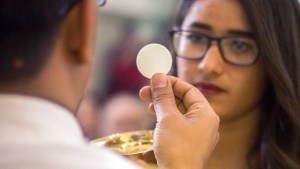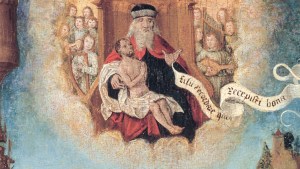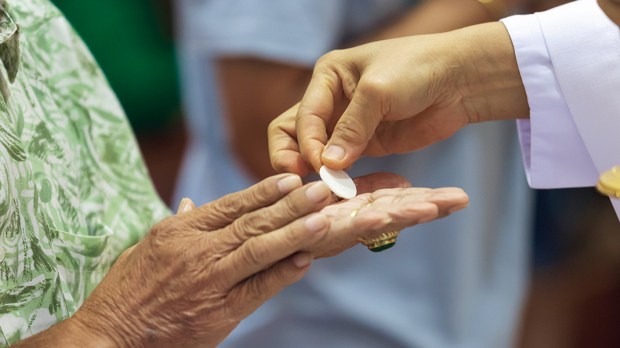Often Catholics used the term communion when speaking about the action of receiving the Eucharistic host at Mass. However, the word is used so frequently that the meaning behind the word is sometimes forgotten.
First of all, the word is used to refer to the union with God that Catholics experience when receiving the body, blood, soul and divinity of Jesus Christ in the Eucharist. The Catechism of the Catholic Church helps explain this aspect of communion.
The Mass is at the same time, and inseparably, the sacrificial memorial in which the sacrifice of the cross is perpetuated and the sacred banquet of communion with the Lord’s body and blood. But the celebration of the Eucharistic sacrifice is wholly directed toward the intimate union of the faithful with Christ through communion. To receive communion is to receive Christ himself who has offered himself for us. (CCC 1382)
The entire Mass is directed toward this primary goal of uniting us with God. To receive communion is to be united with God in a mysterious way that is difficult for us to fully understand in this life.
Holy Communion augments our union with Christ. The principal fruit of receiving the Eucharist in Holy Communion is an intimate union with Christ Jesus. Indeed, the Lord said: “He who eats my flesh and drinks my blood abides in me, and I in him.” Life in Christ has its foundation in the Eucharistic banquet: “As the living Father sent me, and I live because of the Father, so he who eats me will live because of me.” (CCC 1391)
While this is the primary fruit of communion, there is also a secondary aspect to it that unites us with the entire Church.
Those who receive the Eucharist are united more closely to Christ. Through it Christ unites them to all the faithful in one body — the Church. Communion renews, strengthens, and deepens this incorporation into the Church, already achieved by Baptism. In Baptism we have been called to form but one body. The Eucharist fulfills this call: “The cup of blessing which we bless, is it not a participation in the blood of Christ? The bread which we break, is it not a participation in the body of Christ? Because there is one bread, we who are many are one body, for we all partake of the one bread.” (CCC 1396)
The beauty of this communion is that it not only unites us with the Church on earth, but also the Church in Heaven.
To the offering of Christ are united not only the members still here on earth, but also those already in the glory of heaven. In communion with and commemorating the Blessed Virgin Mary and all the saints, the Church offers the Eucharistic sacrifice. In the Eucharist the Church is as it were at the foot of the cross with Mary, united with the offering and intercession of Christ. (CCC 1370)
This is why receiving communion can be an emotional event, as it unites us with all those who have died and who are now in the arms of Jesus Christ in Heaven. Any relative, child, parent or friend who died in the grace of Jesus Christ is united to us at that moment.
Holy Communion is a beautiful part of the Mass and the spiritual realities that are underneath it are difficult to comprehend, but can give us hope that someday we will be united together in a union that will never end.

Read more:
Prepare for holy communion with this prayer of joy and gratitude

Read more:
Why Heaven will be a union of friends, both old and new

